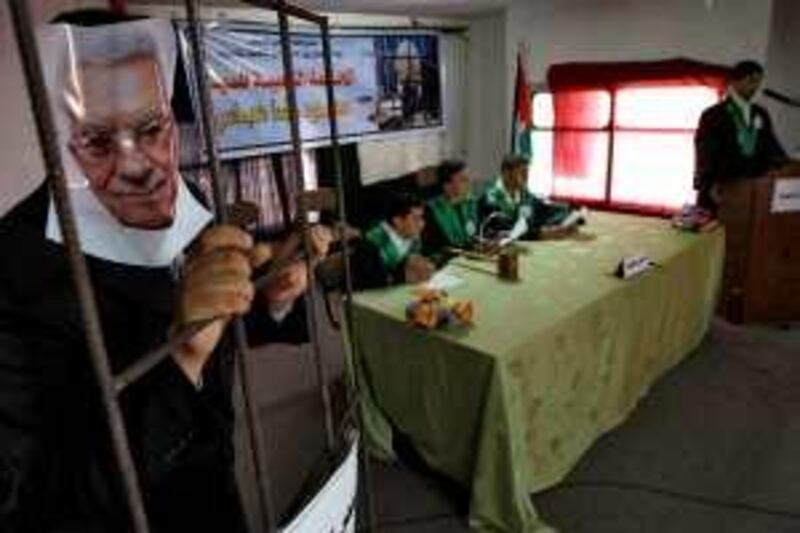RAMALLAH // Reversing the Palestine Liberation Organisation's previous position, Mahmoud Abbas, the Palestinian Authority (PA) president and head of the PLO, said on Sunday that he had instructed the PLO's representative to the UN to push for a vote in the UN's Human Rights Council on the Goldstone report into alleged war crimes during Israel's three-week long offensive there this year.
The decision was announced in a televised address, Mr Abbas's first public statement since a furore broke out last week over the PLO's support for a six-month postponement of the UN vote. But it only sparked a war of words yesterday between Mr Abbas and Hamas, the Islamist group that controls the Gaza Strip. Not long after Mr Abbas's TV appearance, Khalid Meshaal, the exiled leader of Hamas, also appeared on TV from Damascus, denouncing Mr Abbas as an "illegitimate president" who is "leading [Palestinians] to doom".
The escalation between the two rival Palestinian factions could spell trouble for an Egyptian-mediated unity agreement that was scheduled to be signed at the end of this month. That has already been postponed and, observers say, chances are that securing an agreement between Fatah and Hamas to the proposal in the near future is now almost impossible. If so, it represents not only a setback for the Egyptian diplomacy, but for hopes of seeing Palestinian factions begin repairing what almost all Palestinian politicians and observers agree has been a damaging rift.
Mr Abbas spoke enthusiastically about Egyptian efforts to reconcile Palestinian divisions in his TV address, yet repeatedly hit out at Hamas, which he accused of trying to sabotage unity efforts and "destroy the national project". He defended the PLO's efforts vis-à-vis the Goldstone report, and said the organisation had resisted attempts by the United States, the European Union and others to amend the wording of the recommendations. The Goldstone report found both the Israeli military and Hamas militants guilty of war crimes during Israel's operation in Gaza this year and of possible crimes against humanity. It recommended that those guilty be brought to justice, if not by the parties themselves than by the international community.
Mr Abbas said the PLO would not be moved from its position that there will be no negotiations with Israel until the latter agrees to a complete cessation of settlement construction in occupied territory. For his part, Mr Meshaal accused the PA of co-operating with the United States and Israel against Hamas in "exchange for bribes". He said: "Fatah deserves better leadership." Responding specifically to Mr Abbas's TV address, Mahmoud Zahar, a senior Hamas leader in the Gaza Strip, said the Palestinian leader was only trying to "evade responsibility" for his own decisions.
"The last week has been an enormous setback for unity efforts," said Mkhaimar Abusada, a Gaza-based Palestinian analyst. "And the problem with postponing the signing of the [Egyptian] reconciliation agreement is that in that time, the divide is likely to only grow bigger, especially since the ratcheting up of the rhetoric on Sunday." Mr Abusada said that although neither Fatah nor Hamas had been completely satisfied with the Egyptian proposal, nor had they wanted to reject Cairo's mediation. However, under the current circumstances, the intensity of the accusations between the two factions made it impossible for any of them to proceed. "It's going to take a long time before Fatah and Hamas are going to be able to agree to a similar proposal again."
The main thrust of Egypt's reconciliation proposal was to have the factions agree to disagree until new elections were held, hopefully throwing up an answer, something Mr Abbas alluded to in his TV address. But without reconciliation, the likelihood of holding elections in both the West Bank and Gaza Strip is slim to non-existent, leading to a perpetuation of the status quo, which is satisfactory to no one. One option for Mr Abbas is to call elections anyway - he has until October 25 to issue a decree to hold elections if they are to stay on track for the end of January as the Palestinian constitution demands - and hope that way to pressure Hamas into declaring its hand.
Such a decision will probably backfire, Mr Abusada said, causing Hamas to reject any reconciliation talks for the foreseeable future, although it may well be Mr Abbas's only option. "It would be a gamble, and might result in elections in only the West Bank, but it could leave Hamas looking as the party afraid to go to the voters."
okarmi@thenational.ae





